The Program in Africana encompasses the study of world making in Africa and its global diaspora.
About the Program in Africana
Africana adopts progressive interdisciplinary approaches to the understanding of people of African descent in the Atlantic world: Africa, the Americas— with special attention to the United States—and Europe. Our courses examine conceptualizations of “race” and its use as a tool of critical analysis. Attention to the intersection of “race” with other social and political identities informs all aspects of the intellectual project of Africana at Bates.
Goals and Objectives of Africana at Bates:
- To enrich knowledge of histories and experiences of peoples of the African diaspora.
- To demonstrate the importance of “race” as a tool of critical analysis for explaining, among other things, the allocation of economic resources, the formation of personal and group identities, the dynamics of unequal power, the changing nature of political behavior, and the creation of aesthetic expressions.
- To engage students in the critical theorization of the construction of race, with special focus on the ways that this category of difference has changed over time and place.
- To deepen students’ understanding of secular practices, intellectual traditions, religions, and social institutions of African-descended peoples in the US and the diaspora.
- To consider multifarious ways that race intersects with class, gender, ethnicity, disability, sexual orientation, and other modes of social differentiation.
- To facilitate a vibrant conversation between students and faculty across the campus and beyond in a variety of different fields: literature, music, American Studies, art and visual culture, Gender and Sexuality Studies, history, sociology, politics, anthropology, education, rhetoric, and science.
- To communicate effectively in writing and speech.
- To foster engagement in the larger community—local, national, and international.
- To prepare students for fulfilling careers in a variety of fields, including research and teaching; policy, advocacy and community work; law; cultural organization and curating; digitization and management.
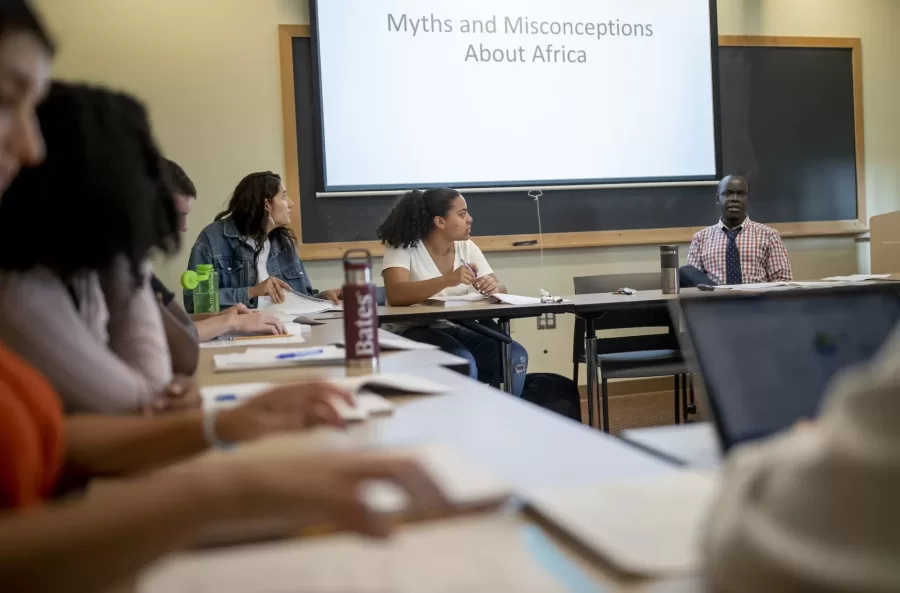
First day of classes in First-Year Seminar with Assistant Professor of History Patrick Otim.
FYS 468 – Beyond Nelson Mandela: Themes and Personalities in South African History
Nelson Mandela became South Africa’s first black president in 1994 after more than three centuries of white dominance. Today, he is considered the greatest African leader of the twentieth century. This popular perception, born of Mandela’s charisma after walking out of jail and becoming president, cut out many actors and events in the history of South Africa. This course introduces students to these obscured actors and events. It begins by exploring the encounter between Europeans and Africans, then examines the institutionalization of the apartheid state, and concludes by studying the reactions to, and defeat of, the apartheid state.
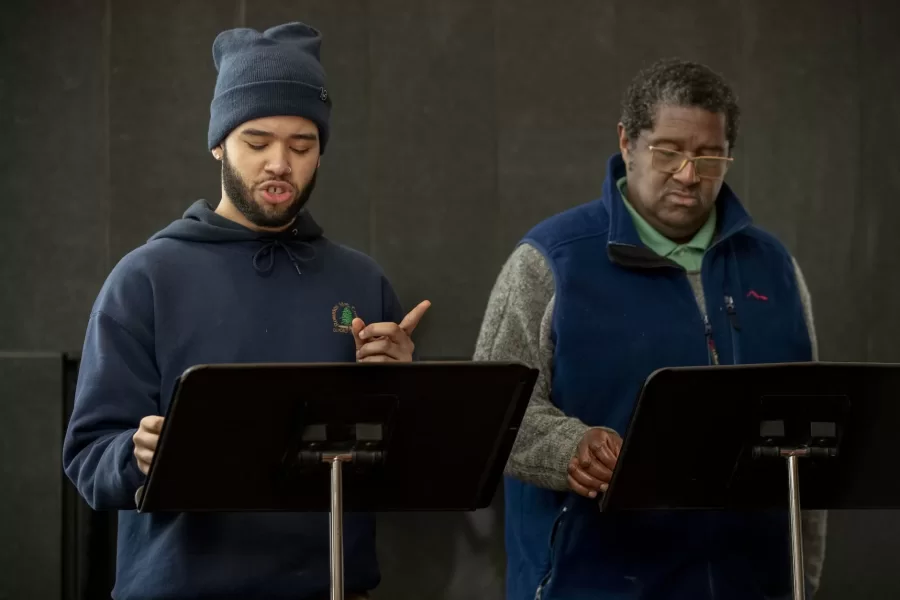
“According to Mark: Part I: Blood in the Revolution.” Commencing a series of plays marking Black History Month at Bates, this 10-minute reading is one of four looking at the 18th-century experiences of black New Englanders and written by Lecturer in Theater Clifford Odle. Sponsored by the Africana program.
Commons, Fireplace Lounge
The title character in According to Mark “was a slave who could read and was looking for a way to free himself from an oppressive master. And he felt the Bible provided a path to murdering him as long as he didn’t spill blood.”
The play is set during the planning of the murder, which also involved two other slaves, Mark’s sister Phyllis and a woman called Phoebe. In the actual event, Mark was hanged for the murder and Phyllis was burned at the stake — a punishment that in Colonial America was reserved for female slaves who kill their masters, Odle says.
Cast:
Charles Nero as Mark
Perla Figuereo as Phyllis
Sam Alexander as Phoebe
Dawrin Silfa as Quaco
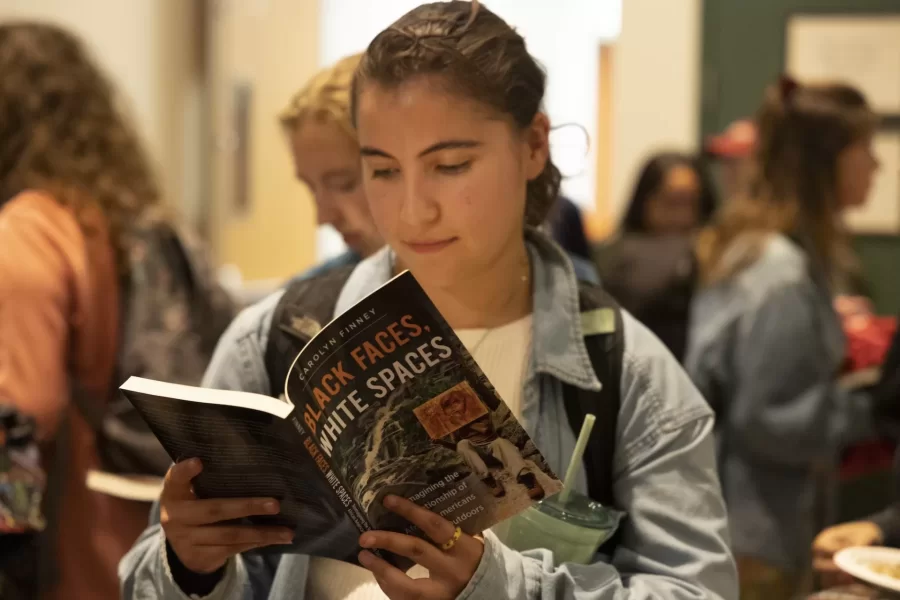
The Bates College Philip J. Otis Committee invites you to attend The 25th Annual Otis Lecture, made possible by the Philip J. Otis ’95 Endowment
Carolyn Finney, author of Black Faces, White Spaces: Reimagining the Relationship of African Americans to the Great Outdoors will deliver a talk entitled “Reparative Gestures: On Race, Redemption and (Re)making a Green World.” A book signing will follow the lecture.
Wednesday, October 12, 2022
7:30 p.m.
Olin Arts Center Concert Hall
Bates College
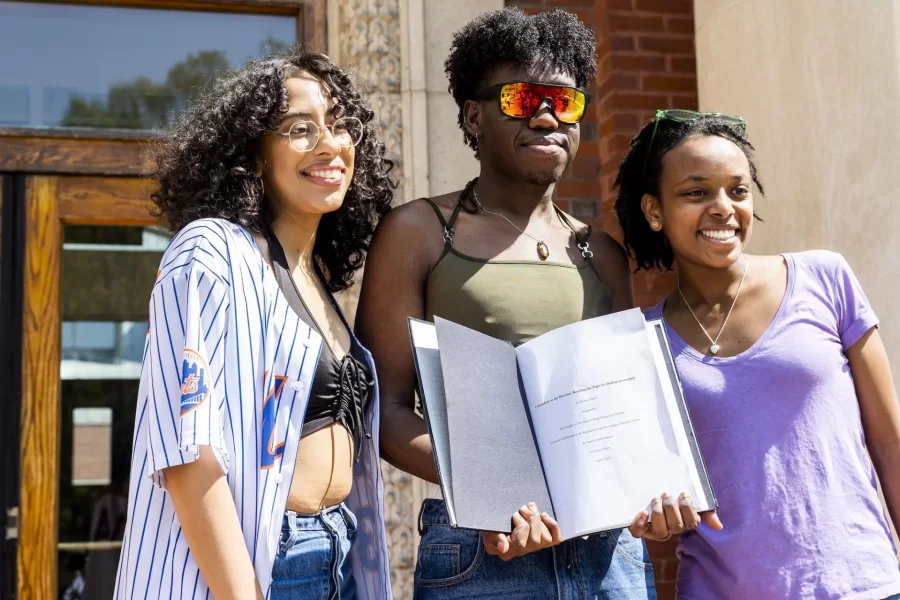
“In many ways, my honors thesis has been a source of love, for which I will forever be grateful.”
A crowd of about 50 students, faculty, and staff gathered on the front steps of Coram Library to celebrate Sam Jean-Francois ’23 of Medford, Mass., and bind Jean-Francois’ honors thesis in Africana, titled “Colonialism as the Disaster: Retelling the Fight for Haitian Sovereignty,” with Associate Professor and Co-Chair of Africana Sue Houchins serving as Jean-Francois’ “proud adviser.”
The thesis “has been a heuristic exercise centered in my journey to uncover more about my history, my family’s history, and Haiti’s history as the world’s first free Black republic,” said Jean-Francois.
“Through this thesis I’ve had the opportunity to engage with the works of Haitian scholars such as Myriam Chancy, and reconnect with my mother tongue, Kreyol.”
Laughing at calls to read the whole thesis aloud (all 126 pages of it,) Jean-Francois read the acknowledgments page aloud, and then bound the thesis, with the help of Verina Chatata ’26 of Lilongwe, Malawi, followed by a joyous shake-and-pop with a bottle of champagne, adorned with a Haitian flag.
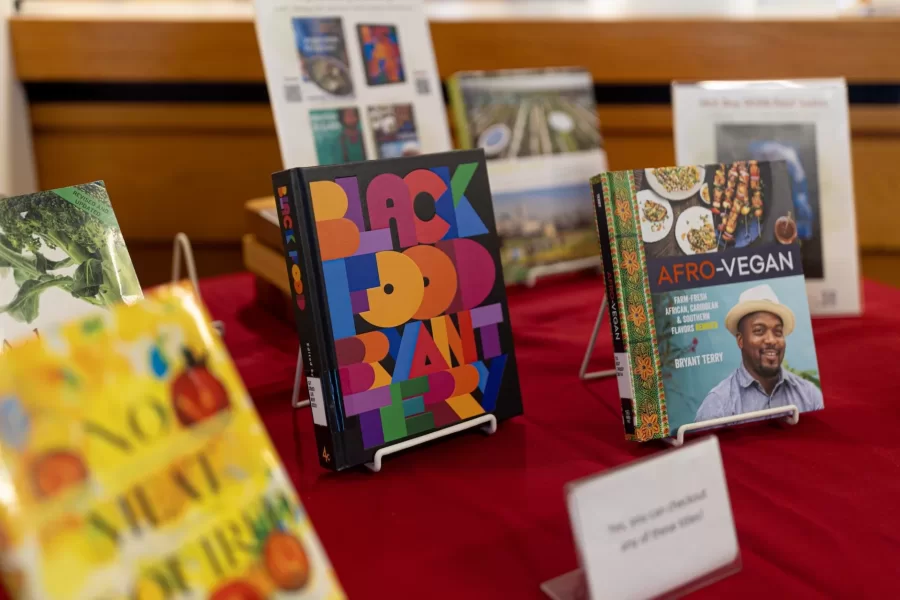
Welcome back!
The winter semester at Bates began today, Wednesday, Jan. 10, 2024. After consecutive snow and rain storms — one of each — the warmth of the sun reappeared midday, along with the pleasure of reconnection.
Swipe left for photographs of folks who were willing to be described as “happy to see one another after winter break.”
Their smiles tell the story.
Tim Ruppert ’27 (in black jacket and tan pants) of Edina, Minn., stops for a chat on Alumni Walk with Jack McAvoy ’24, a politics and philosophy major from Scarsdale, N.Y., and as they return to campus after winter break.
McAvoy was Ruppert’s AESOP Habitat for Humanity II trip leader in Rockland, Maine. They teamed up with other students to build a cul de sac.
Books on display for MLK Day 2024, featuring cookbooks by keynote speaker Bryant Terry.
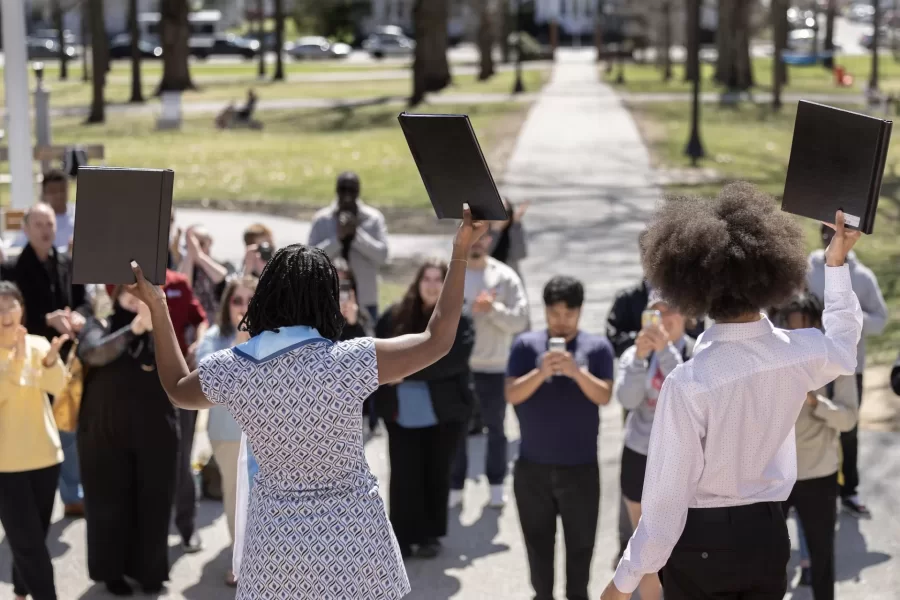
Two close friends who met on their first day at Bates chose to bind their senior theses together on the steps of Hathorn Hall on April 17, 2024.
In the company of friends, staff, and faculty, Aaliyah Moore ’24 and Prinnes Wilson’24 paid tribute to each other, to those gathered, and to family members who have supported them along the way.
Wilson, a psychology major from Las Vegas, wrote a thesis titled “The Relationship Between Aging and Proximity to Clothing,” under the supervision of Visiting Assistant Professor of Psychology Katherine Mathis. After the binding, Wilson expressed pride in his thesis. “It’s a good representation of me,” he said.
Moore, a double major in Africana and politics from Phoenix, Ariz., bound two theses. Her honors thesis in Africana, written under the supervision of Professor of English Therí Pickens, is titled: “Alice Walker’s ‘The Color Purple’: An Authentic Depiction of Confinement in Historical Fiction.” Moore called Pickens her “spiritual guide” whose “unwavering support, grace, and kindness know no bounds.”
Moore’s politics thesis, written under the supervision of Professor of Politics Stephen Engel, is titled “Rethinking the Supreme Court’s Approach to Discrimination Cases: Adopting a Comprehensive Framework.”
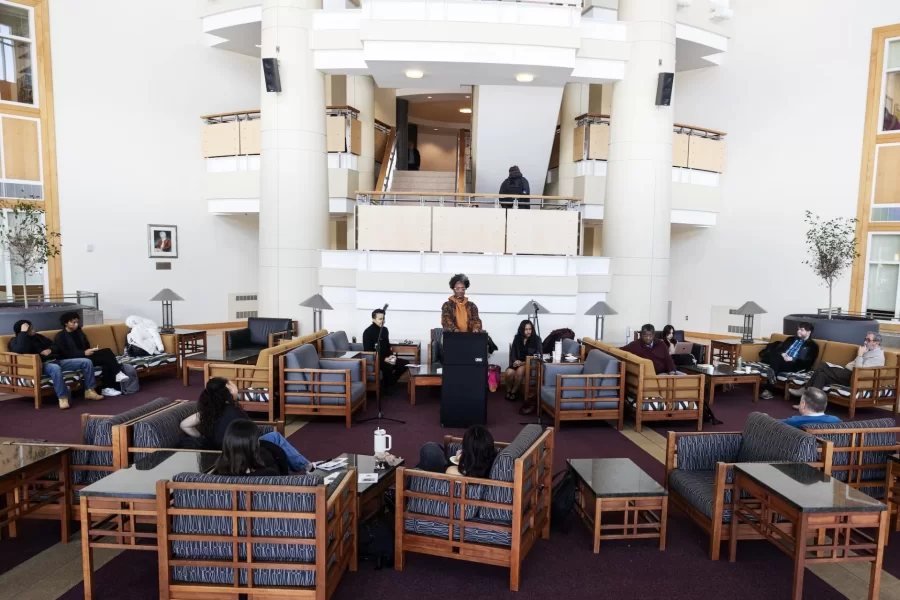
Moments from the event, “Who is Trayvon Martin? Celebrating Black Life & Legacy in Perry Atrium on March 26, 2025. Sponsored by the Program in Africana as part of our Black Life & Legacy Series. Marcelle Medford, associate professor of sociology, Frances Bell, visiting assistant professor of history, Catherine Saunders, visiting assistant professor of africana, Ian Khara Ellasante, assistant professor of gender and sexuality studies and Charles Nero, Benjamin E. Mays ’20 Distinguished Prof of Rhetoric, Film, and Screen Studies.
(Theophil Syslo | Bates College)
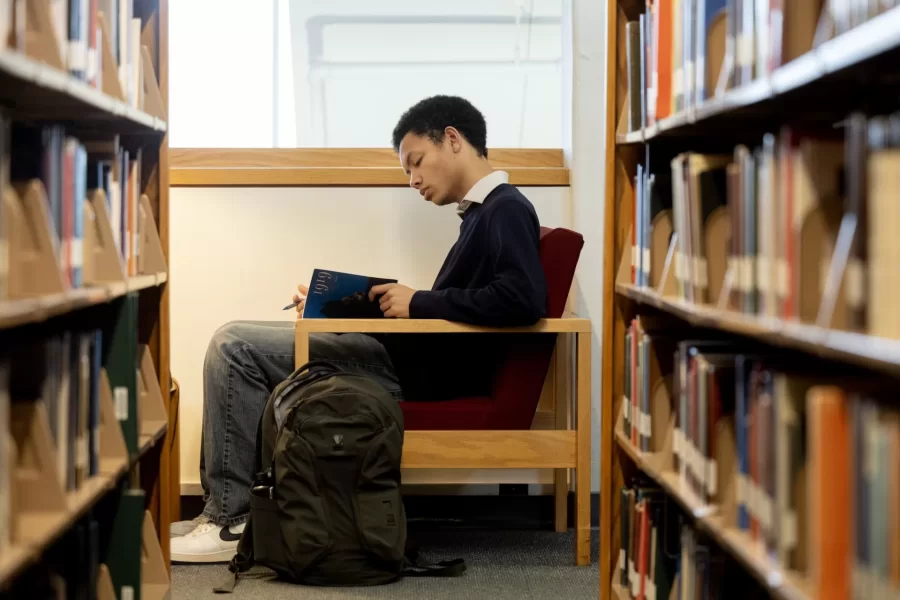
Day in the Life of Ladd Library on March 12, 2025. (Phyllis Graber Jensen/Bates College)
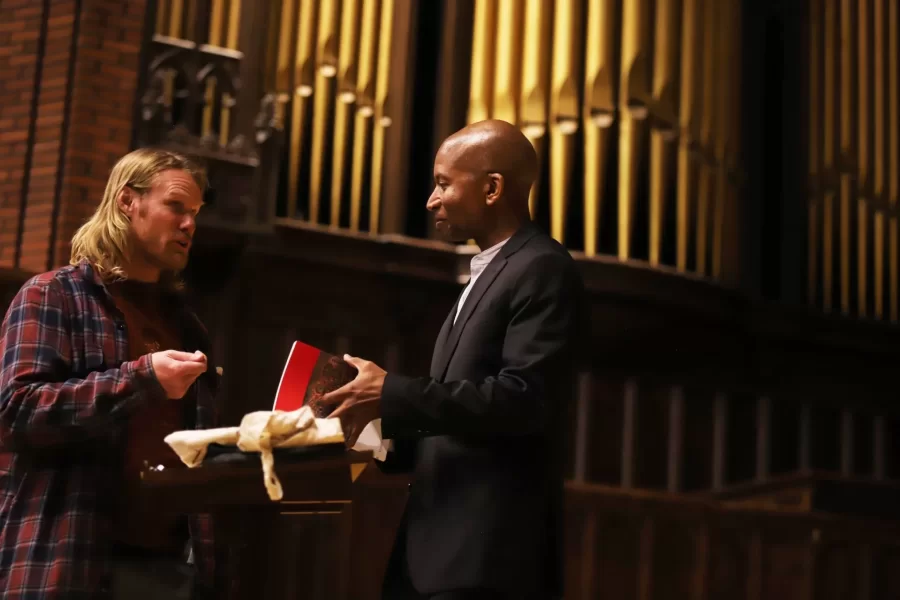
Bates English professor Myronn Hardy spoke about his new book, “Aurora Americana,” and read poems from it in Gomes Chapel on Oct. 11. Myronn Hardy’s Poetry Book Launch and Reading
October 11, 2023
Peter J. Gomes Chapel
7:00 – 8:30 PM
Myronn Hardy, Assistant Professor of English, will read from his newly published book of poems, Aurora Americana (Princeton University Press, 2023).
His other books of poems include: Approaching the Center, The Headless Saints, Catastrophic Bliss, Kingdom, and Radioactive Starlings.
He has received several awards and fellowships.

Academic Fair in Pettengill Hall’s Perry Atrium. For three hours this morning, faculty spoke with members of the Class of 2023 about their departments’ offerings.
Charles Nero, rhetoric









